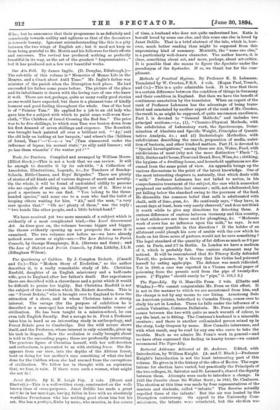Methods of Practical Hygiene. By Professor K. B. Lehmann. Translated
by W. Crookes, F.R.S. 2 vols. (Kagan Paul, Trench, and Co.)— This is a quite admirable book. It is true that there is a certain difference between the condition of things in Germany and their condition in England. But then we have the benefit of continuous annotation by the translator. When an expert of the rank of Professor Lehmann has the advantage of being trans- lated and annotated by another expert of the rank of Mr. Crookes, the result is, as might be supposed, of quite uncommon excellence. Part I. is devoted to " General Methods," and includes two principal sections,—i.e., (1), " Chemica-Physieal Methods, with the subdivision of Laboratory work, the Spectroscope, Deter- mination of Absolute and Specific Weight, Principles of Quanti- tative Analysis, &c. ; and (2) Bacteriologic Methodics, with subdivisions describing the search, preparation of media, nutri- tion of bacteria, and other kindred matters. Part II. is devoted to " Special Investigations," among these are Air, Water, Food, with subdivisions of meat (why not the more distinctive " Flesh" ?), Milk, Butter and Cheese, Flour and Bread, Beer, Wine, &e. clothing, the hygiene of a dwelling-house, and household appliances are dis- cussed from the same point of view. An appendix brings up the various discussions to the point of the latest knowledge. One of the most interesting chapters is, naturally, that which deals with " milk." Professor Lehmann has not failed to notice, in his comprehensive treatment of the subject, the case which somewhat perplexed our authorities last summer ; milk, not adulterated, but yet falling below the standard owing to the poorness of the feed. He discredits the common belief that milk is adulterated with chalk, milk of lime, gum, &c. He cautiously says, "they have, in recent days at least, been very rarely observed," and does not think it worth while to give any directions for detecting them. A curious difference of custom between Germany and this country, is that milch-cows are there used for ploughing, &c. " Moderate work of cows has no influence upon the milk," he says. Is not some economy possible in this direction ? If the holder of an allotment could plough his acre of arable with the cow which he feeds on his three acres of pasture, would not he save something ? The legal standard of the quantity of fat differs as much as 3.5 per cent. in Paris, and 2'7 in Berlin. In London we have a medium of 3, which is probably fair. One curious statement may be noticed. It will be remembered that Sir Fitzroy Kelly defended Tawell, the poisoner, by a theory that his victim had poisoned herself by eating apple-pips. The defence was much ridiculed. Yet in 1886, a case was reported in a Vienna medical paper of poisoning from the prussic acid from the pips of twenty-five pears. (" Pippins " should surely be " pips," ii. 163,1. 2.)


















































 Previous page
Previous page